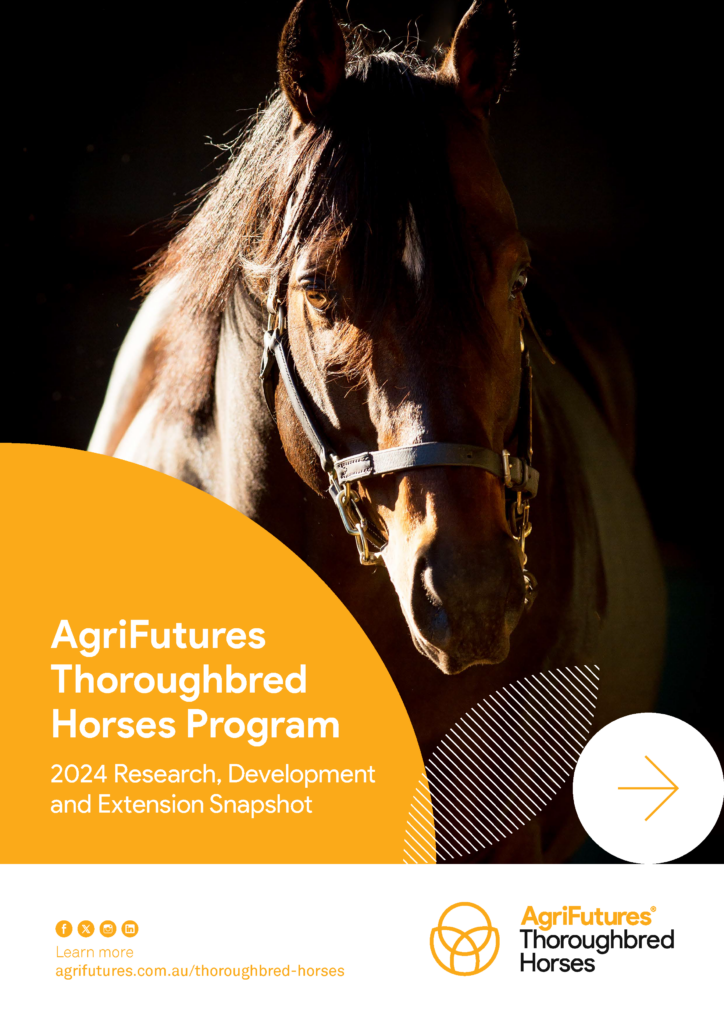Snapshot: Antimicrobial prescribing guidelines for horses
This document represents the first comprehensive resource providing detailed guidance on the management and treatment of common bacterial diseases in horses in Australia. Key highlights...
 THOROUGHBRED HORSES
THOROUGHBRED HORSES 
80 pages
Published: 4 Dec 2024
Author(s): AgriFutures Australia
ISBN: 978-1-76053-511-7
Download report PDF
DownloadPurchase a hard copy - AUD $50
Message from the Panel Chair
Dr Catherine Chicken, Chair, AgriFutures Thoroughbred Horses Advisory Panel
During the past 12 months, key research investments made by the AgriFutures Thoroughbred Horses Program have culminated in practical tools and guidelines for industry.
As we approach the halfway point of our second strategic planning period, the Program is maturing and we are delivering timely and relevant resources that promote industry productivity, profitability and sustainability, and will contribute to improved welfare outcomes for our horses and the humans who work with them.
Whether our research teams are finding ways to reduce mid-to-late-term pregnancy losses, clarifying the potential impacts of yearling endoscopy or x-ray results, or developing cutting-edge solutions for rapid disease diagnosis, our investments are addressing significant industry challenges.
The stories contained within the pages of this RD&E Snapshot are testament to our dedicated researchers, program managers and Advisory Panel members, who are committed to ensuring industry levies result in on-the-ground impact.
The quality of our equine researchers was highlighted at the 44th Bain Fallon Memorial Lectures in July, where Dr Joan Carrick received the Jane Axon Award for Excellence in the Equine Veterinary Field, Assoc. Prof. Victoria Brookes received the EVA Reginald Pascoe Prize and Dr Brodie Argue received the ANZCVS Equine Chapter Prize for the most outstanding abstract.
However, the path from discovery to delivery is rarely linear and it pays to remember that research, by its very nature, often involves exploring unchartered territory, gathering information and building foundational knowledge that will underpin future advances. It is important to respect the process and recognise the wins along the way. The ability of our research teams to pivot as they encounter barriers and seek solutions through alternative approaches speaks volumes to their dedication.
Regardless of the myriad pathways our research projects might follow, we are grateful for the breadth of expertise we can draw on to seek meaningful solutions for our industry.
Changing of the guard
On behalf of the Advisory Panel, I’d like to acknowledge the diligence and commitment of our former Research Manager, Annelies McGaw, and thank her for her contribution to the Program over five years. At an important time in its evolution, Annelies provided stability on which the Program thrived. Under her guidance, we have accomplished significant goals, many of which are only now being realised, through our rapidly expanding collection of extension resources.
Similarly, I welcome our new Research Manager, Caitlin Smith, who is well credentialled to help us take the next step on the journey. With her technical expertise, industry experience and global connections, I am confident Caitlin will help us continue delivering meaningful and relevant RD&E outcomes for our industry.
Message from the Research Manager
Caitlin Smith, Research Manager, AgriFutures Thoroughbred Horses Program
As I look over the projects showcased in this year’s RD&E Snapshot — my first as Research Manager with the AgriFutures Thoroughbred Horses Program — I am excited about the opportunity to give back to an industry I am truly passionate about.
I hail from a small thoroughbred farm in country Victoria, and this upbringing sparked my passion for horses at an early age. After graduating from Charles Sturt University (CSU) with a Bachelor of Animal Science, I went on to do my Honours degree investigating the risk factors associated with abortions caused by Chlamydia psittaci in thoroughbred mares — a topic close to the hearts of several of our researchers.
I then spent two years with Agriculture Victoria before participating in the two-year Godolphin Flying Start international management and leadership scholarship program. The scholarship took me to studs and racing stables across England, Ireland, the United States, France and Australia. It was a life-changing experience that provided me with insights into the challenges and opportunities faced by thoroughbred racing and breeding industries in all corners of the world.
Although some challenges faced in Australia are unique, many are shared, and by collaborating with our counterparts around the world we can improve the outcomes for everyone. The recognition of CSU’s Equine Science group researchers at the International Conference of Racing Analysts and Veterinarians in Hong Kong for their work on drug monitoring, treatment and analysis is evidence of the power of collaboration and highlights the quality of our research programs.
Following the scholarship, I returned to Australia to work as Bloodstock and Research Manager for Michael Freedman Racing, and most recently worked as a journalist with The Thoroughbred Report and as Project Manager with Kick Collective. This new role feels like the next logical step in driving positive change for the industry through extending research outcomes in a targeted, relevant and practical way that supports effective change on the ground.
An exciting time for equine research
We have an enormous opportunity to close knowledge gaps in areas such as equine fertility and pregnancy loss, and address emerging global issues such as antimicrobial resistance and the increasing resistance to commonly used dewormers. I want to be part of this gathering of knowledge.
My tertiary background and industry experience mean I understand how the Program can work for both researchers and industry — I see immense value in fundamental research, but I am also keenly aware of the need for relevant, timely and practical solutions for industry. I am excited about supporting stakeholders in navigating their challenges and delivering the information they need to make informed decisions that will improve the sustainability and profitability of Australia’s thoroughbred industry, and the welfare of its horses.